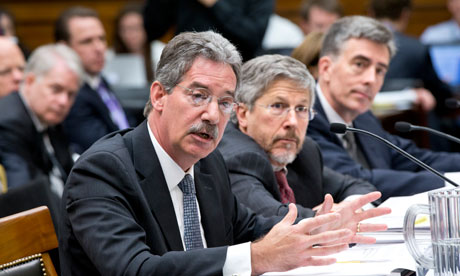- guardian.co.uk, Wednesday 17 July 2013 15.19 EDT

NSA officials James Cole, Robert S Litt and John Inglis appear before House committee. Photograph: J Scott Applewhite/AP
"Hops" refers to a technical term indicating connections between people. A three-hop query means that the NSA can look at data not only from a suspected terrorist, but from everyone that suspect communicated with, and then from everyone those people communicated with, and then from everyone all of those people communicated with.
Inglis did not elaborate, nor did the members of the House panel – many of whom expressed concern and even anger at the NSA – explore the legal and privacy implications of the breadth of "three-hop" analysis.
But Inglis and other intelligence and law enforcement officials testifying before the committee said that the NSA's ability to query the data follows rules set by the secret Fisa court, although about two dozen NSA officials determine for themselves when those criteria are satisified.
A document published last month by the Guardian detailing the history of the NSA's post-9/11 bulk surveillance on telephone and internet data refer to one- or two-hop analysis performed by NSA. The document, provided by ex-NSA contractor Edward Snowden, does not explicitly mention three-hop analysis, nor does it clearly suggest that such analysis occurs.
Wednesday's hearing was the second major public congressional hearing about the NSA's surveillance activities since the Guardian and the Washington Post disclosed some of them in early June. Unlike the previous hearing on June 18 before the House intelligence committee, members of the House judiciary committee aggressively questioned senior officials from the NSA, FBI, Justice Department and Office of the Director of National Intelligence.
One senior member of the panel, congressman James Sensenbrenner, the author of the 2001 Patriot Act, warned the officials that unless they rein in the scope of their surveillance on Americans' phone records, "There are not the votes in the House of Representatives" to renew the provision after its 2015 expiration.
"You're going to lose it entirely," Sensenbrenner said.
Inglis and deputy attorney general James Cole repeatedly argued that the NSA's surveillance was limited because it only searches through its databases of phone records when it has a "reasonable, articulable suspicion" of a connection to terrorism.
But several members of the committee, of both parties, said they were concerned not merely about the analysis of the phone records but about NSA's collection of millions of Americans' phone data in the first place, without an individual suspicion of connections to terrorism.
"The statute says 'collection'," congressman Jerrold Nadler told Cole. "You're trying to confuse us by talking use."
Read More Here










No comments:
Post a Comment
Hello and thank you for visiting my blog. Please share your thoughts and leave a comment :)